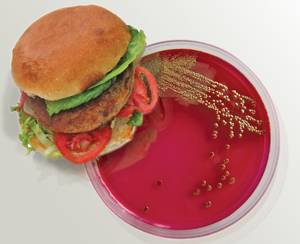Lab-grown meat is what’s for dinner

Lab-grown meat is what’s for dinner
October 20, 2008
A compromise between vegetarians and meat-lovers may take form in lab-grown meat.
According to Discover Magazine’s article “I’ll Have My Burger Petri-Dish Bred, With Extra Omega-3,” by Susan Kruglinski and Karen Wright, lab-grown meat is meat grown from stem cells of animals that could “alleviate environmental and health concerns associated with most animal protein.”
Although the meat could be healthier because of nutritional enrichment, there are still problems to be sorted out, including making the meat appealing and affordable.
Emma Miles, sophomore in apparel, design and merchandising, vegan and vice president of ISU Vegetarians/Vegans, said she doesn’t have a strong stance on being for or against lab-grown meat. Miles does appreciate its health benefits and the promise lab-grown meat is better for the environment than the heavily polluting traditional meat industry.
“I think that it’s good we are trying to do things that are healthier and that are less harmful to the environment and animals,” Miles said.
There are others who aren’t as interested in these considerations though.
Daniel Funk, junior in computer engineering, who said he eats meat about 10 times a week, said taste is the most important factor.
“The factor that it harms animals is not something that bothers me,” Funk said. “I would just be concerned about if it tasted better.”
According to Kruglinski and Wright’s article, scientists “believe its flavor should eventually compare favorably to that of natural meat.”
Funk said the idea of “lab-grown meat” doesn’t necessarily appeal to him because it seems unnatural.
“I don’t think it’s natural to the way things should be,” Funk said.
Miles said she thinks people may consider lab-grown meat less appealing than natural meat, making lab-grown meat hard to market.
“I think it’s really interesting that the gross factor is in it being ‘fake’ meat but I guess we are kind of strangely brainwashed that it’s not gross to bite into an animal that was living and breathing but it’s gross if it was grown in a lab,” Miles said. “For that reason, it might be hard to market it to people but I think over time people would start getting over that, especially with the health benefits and everything.”
Miles said she would not promote lab-grown meat over a vegetarian lifestyle but that if people were interested in it over meat, she would recommend it.
“A vegetarian diet is more ideal in terms of animal cruelty and really in terms of most aspects of it so I guess I would recommend a vegetarian diet,” Miles said. “If people are really not interested in pursuing a vegetarian lifestyle, I would definitely suggest this.”
While scientists continue to research the area of lab-grown meat, it may not be a realistic concept for the world right now, but Miles said she thinks it could change people’s perspectives on the way things work.
“It’s a new technology like everything else and that obviously changes how we think about things and how we go about doing things,” Miles said. “I think it might allow more people to kind of start thinking about animal welfare more.”






